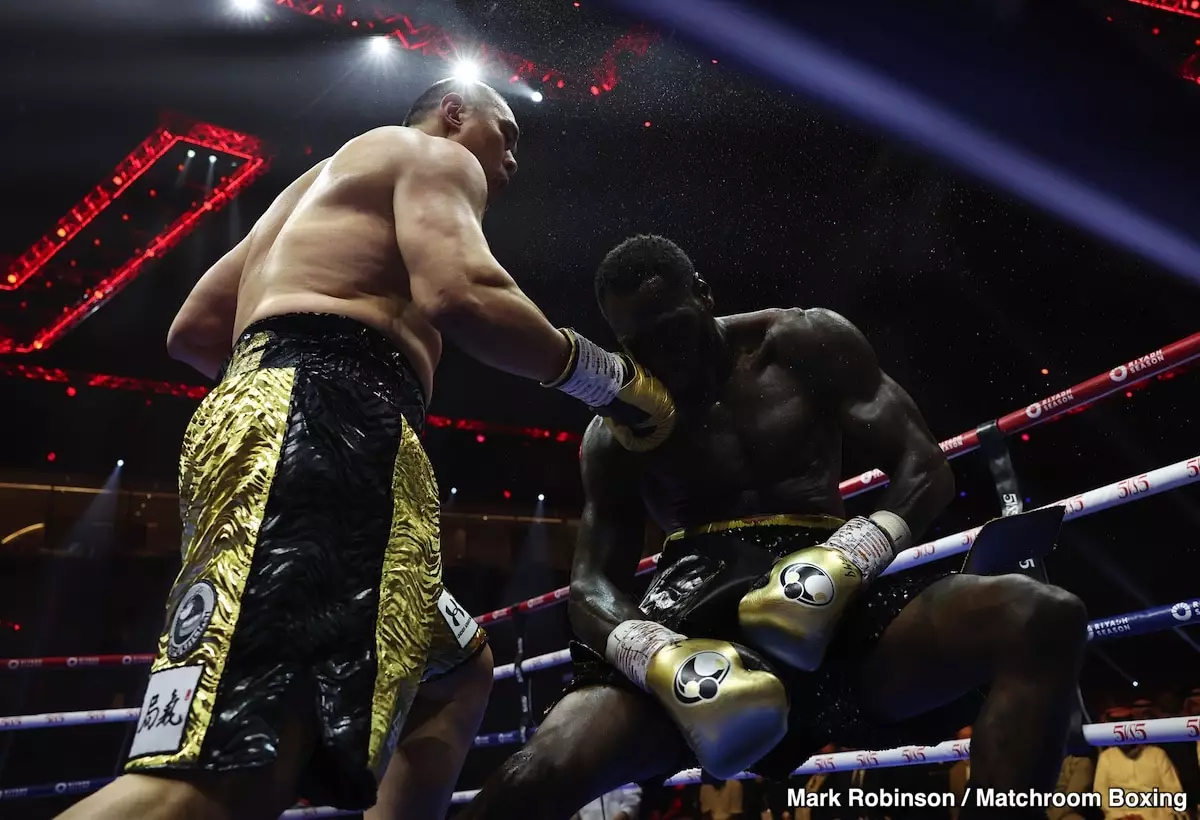BY BOXING HIT STAFF-
Deontay Wilder, renowned for his sheer power and explosive knockout rate, has experienced a troubling decline in performance ever since he teamed up with trainer Malik Scott in 2021. Once considered a formidable heavyweight champion with ferocity comparable to that of a lion, Wilder’s recent performances, particularly in his losses to Zhilei Zhang and Joseph Parker, have raised significant eyebrows within the boxing community. The striking analogy provided by Derek Chisora, who remarked that Wilder has transformed from a “lion” into a “cat,” speaks volumes about the perceived change in the fighter’s mentality and aggressiveness in the ring. This shift has devastated the once-dominant presence Wilder held in heavyweight boxing.
Chisora’s concerns stem from Wilder’s underwhelming performance against fighters he was expected to defeat. He pointed out that Wilder’s lack of aggression and his failure to throw his right hand in recent bouts symbolize a deeper issue—one that might be rooted in his coaching strategy under Malik Scott. Since Scott took over, Wilder’s record stands at a disappointing 1-2, a stark contrast to his previous dominance as a WBC champion. This downward trajectory prompts inquiries about Scott’s effectiveness as a trainer and the potential psychological impacts of their partnership.
The dynamics between a fighter and a coach are crucial for success in boxing, and in Wilder’s case, the impact of Malik Scott comes under scrutiny. Scott, who was once a fighter himself, has attempted to instill a more technical and strategic approach to Wilder’s boxing style. However, the results have not matched the expectations. Chisora’s critique emphasizes a perceived failure in Scott’s ability to ignite the aggressive spirit that characterized Wilder’s earlier fights. Instead of harnessing his natural instinct to engage and dominate, Wilder seems to have become tentative and overly cautious, which has inevitably affected his performance and game plan.
The expected engagement with opponents has been absent. Chisora highlighted that Wilder’s lackluster encounters with lesser opponents like Parker amplified his struggles, suggesting that Scott has not revitalized Wilder’s boxing identity. By failing to adequately motivate and prepare Wilder, Scott may have inadvertently smothered the fighter’s innate ferocity, leaving him vulnerable and disengaged in critical moments of the fight.
While Wilder’s declining performance might raise alarms from a competitive standpoint, economic factors should not be overlooked. As one of the wealthiest boxers in the division, Wilder’s financial security could enable him to weather the storm of a difficult career phase more comfortably than many other fighters. This raises an interesting question: does financial independence delay the urgency for change? Unlike fighters who rely heavily on their ring performances for survival, Wilder might not feel the impending pressure to make drastic adjustments to his training or coaching staff. Chisora’s frustration resonates here; he comments on the seeming lack of urgency from Wilder regarding his training and performance under Scott. If Wilder truly wishes to reclaim his status in boxing, he must act decisively, even if it means severing ties with someone he has come to trust.
Wilder’s upcoming birthday marks his 39th year, leading many to ponder: is it too late for him to salvage his career? However, taking swift action to replace Scott could potentially reinvigorate his fighting style. The transition to a new coach, especially one seasoned in rejuvenating fighters, could help restore his confidence and remind him of the “lion” within, fostering the aggressive mindset he thrived on.
Chisora hints at the possibility of Wilder needing someone who can reignite that fire within him, suggesting that a change in approach is paramount. To say that Wilder should have made adjustments after his initial losses to Tyson Fury is an understatement; it is a pivotal necessity if he hopes to rise again. With each passing fight, the stakes only grow higher—not just for competition but for his legacy as a boxer.
Deontay Wilder stands at a crossroads. His association with Malik Scott is in question, and the imperative for change has never been more resolute. The boxing community continues to watch with anticipation; fans hope to witness a resurgence of Wilder’s former prowess, a lion ready to roar once again. Conversely, as Chisora poignantly expressed, the risk of becoming comfortable and complacent at the top can lead to catastrophic outcomes. Wilder’s next steps could define whether he reclaims his status or continues to fade into obscurity. Ultimately, only time will tell if he chooses the path of resurgence or resignation.


Leave a Reply